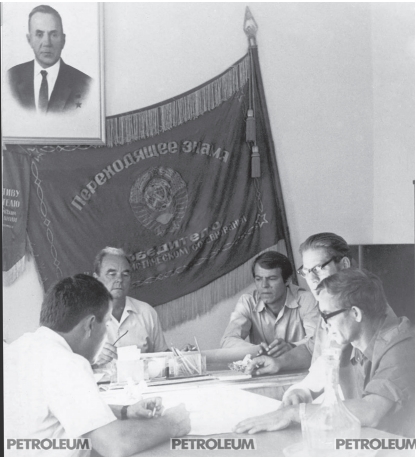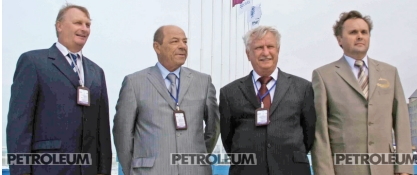Anniversary
Hardened By Pipeline Steel
 Briefing meeting at Guryev Pumping Station: V.M.Schelochilin (Head of PS), F.A.Mamonov (Mechanical Engineer) and other employees, 1970s.
Briefing meeting at Guryev Pumping Station: V.M.Schelochilin (Head of PS), F.A.Mamonov (Mechanical Engineer) and other employees, 1970s.This year the pipeline transport of Kazakhstan celebrates 80 years. This is a significant and important event for the whole country, because the development of the oil transportation system is an essential component of the overall progress of the domestic oil and gas industry.
History of Kazakhstan’s oil transport system is a glorious and decent way of development, which was accomplished to to a huge role, played by the people whose names were included in the records of the country’s oil. One of the outstanding veterans of the oil industry is Ferdinat Mamonov, participant and head of many large petroleum projects, with no analogues in the world. He is one of those who gave the establishment and development of domestic oil transportation system for nearly 50 years. His name entered the history of the oil and gas industry and he joined such legendary figures as Anatoly Kashirsky, Ivan Casper, Taras Kassymov and others.
Ferdinat Abrakhimovich says about himself: “My way to the oil&gas industry was a foregone conclusion.” His grandfather and father were the drivers and they have worked all life at the fielf, the younger sister gave her whole working life to the oil industry and she was retired after working in Embaneft. Ferdinat Mamonov started his career in the oil industry as a mechanic and machine operator of a process pump at the construction of Uzen-Atyrau-Samara pipeline. It was the end of the 60 ‘s, the time of discovering the major fields of Kazakhstan-Uzen, Karazhanbas, Buzachi, with huge oil reserves. But it is not enough to produce the oil extract, it is equally important to transport it. Timely and responsive oil transport system ensures the development of the field.
-Then we spent day and night at the construction site, sometimes, we had the weeks without going to the city, we practically lived at the construction site, we were dirty, tired, hungry, - says Ferdinat Abdrakhimovich. -But we thought only of how to run a pipeline in time. I was lucky with the mentor: the first chief of OPS was Venedict M. Schelochilin, he taught me to love my work and to work the way I would never ashamed of the results.
The was a respected oilman, great professional, and very kind person. I well remember his paternal words addressed to us, young engineers. He said: “Be patient, folks. The builders will be gone and we will live well afterwards. The flowers will be planed around. All will be beautiful in our work place.” His words, of course, helped us to survive the domestic difficulties, but we didn’t managed to plant the flowers. Then I realized: nothing can be delayed for later term-it is required to live fully and well right now.
The first batch of Mangyshlak oil was sent to Guryev refinery on July 10, 1965. The first tanker Jabrayil of Caspian shipping company was loaded and sent for processing to Volgograd oil refinery on October 10, 1966. In order to send the oil from pumping station “Shevchenko” by the rail and sea transport from the port of Aktau, where the terminal was built, we used the pipeline Uzen-Zhetybai-Shevchenko (now -Aktau), with 529 mm in diameter.
Since the oil contained the paraffin and transport was difficult, it became a solid mass under normal temperatures-the heating furnaces were built at Uzen-Shevchenko part of the pipeline. But their capacity was not enough. In the mid 1960 ‘s, the Government of the Soviet Union decided to build a hot-oil pipeline Uzen-Kuibyshev with larger diameter of 1020 mm.
The first phase was the construction of Uzen-Kulsary-Guryev line and the second -Guryev-Samara and then connecting them to Druzhba pipeline . Mangyshlak oil with high paraffin content created certain difficulties for its transport, filling and storage. Therefore, the oil pumping stations (OPS) were built together with the heating furnaces and storage tanks were equipped with heaters. In addition, the separate heating units were provided in-between the OPS. The total length of pipeline Uzen-Guriev-Kuibyshev was 1380 km, with 9 pumping stations, 15 heatings units, located along its total length.
The first stage of Uzen -Guriev pipeline was put into operation in August, 1969. Then approaching the source of oil supply, we ran the intermediate heating points, “66 km”, “Sai-Utes”, “Beineu”, “Opornaya”, “Kulsary”, “601 km”, “OPS-663 km” pumping stations. And, finally,the oil pumping station “Guriev”, one of the largest on the pipeline (now the OPC named after T.Kassymov). In April 1971, the oil came to Samara. This pipeline at one time was called “hot river” of the USSR.
- Starting up such a complex, unique oil pipeline, which had no analogues in the world, was a historic event,- continues Ferdinat Mamonov.-The ceremony of commissioning was attented by the First Secretary of the Regional Party Committee M. Issenov, Deputy Chairman of the Soviet Oil Industry and the Head of Acceptance Commission Sh.Dongoryan, Chairman of the Working Committee Nuribek N.Shmanov (he then worked as the Head of the Caspian -Orsk Oil Pipeline Department, the only in Kazakhstan). Head of pumping station Uzen was Frangiz Mulyukov, a young specialist who later became Chief Engineer of Yuzhnefteprovod.
There was no ceremony then, as I remember. Everyone was nervous and worried. Operators with torches incited the nozzles, manually opening and closing the bolts of large diameters. Another difficulty was the following: we used Mangyshlak oil for heating the nozzles (there was no gasification yet), that hardened in the fuel lines, even on the way to the nozzles.
There were torches to heat the oil, providing access to the nozzles of heating furnaces. And when all goes well, joy bounds. At the initial stage of the operation the situation was very difficult. People had no experience of work at a unique pipeline. There were the complications, because all was mastered for the first time. Sometimes, all the flow hardened and then all the people spent day and night in the heated containers or booths, ensuring a return to a reliable work pace. The remoteness of the OPS from each other (90-100 km), off-road, lack of telephone communications, dining room, dormitories- the conditions were not simply the Spartan, they were truly heroic.
Naturally, we were all excited and forgot the hardship,-continues Ferdinat Abdrahimovich. -I think that the important role was played by the friendship, mutual understanding at work. During the starting-up and adjustment works, lot of petroleum specialists from Tatarstan, Bashkiria, Azerbaijan were involved at the pipeline. Although they have never seen such a pipeline before, jointly we had the rotations, training and we were acquiring the job skills.
The efforts of people were not in vain. In the last days of August 1969, the first train was loaded with oil from the oil tank farm at Guriev loading station for transporting to Volgograd oil refinery. This date is the date of birth of one of the largest stations-Guriev oil trans-shipment statiom (now the OPC named after T. Kassymov). His first chief was Venidict Mikhailovich Schelochilin.
-I consider myself as lucky one because on my way I met the people, one better another, both as the professionals, mentors and leaders,- said the veteran. -Anatoliy Ivanovich Kashirsky, Viktor Pavlovich Balduev... People are the decisive factor. In those years there were almost no pipeline specialists. The main role was played by managers and specialists of the then-operating oil pipeline Caspian Sea-Orsk- Nuribek Shmanov, Ivan Casper, Mavey Rubalskiy, Vasily Shvabauer, Gennady Chebotarev, Victor Sutyagin, Anatoly Vikhrev, Maria Nurgalieva, A.A. Koszhanov, Lev Zhuravlev, Valentina Kovalyova, Tamara Tryakina, Alexandra, Chepaskina, Valentina Grigoryeva, Lydia Vashurina, Tamara Rotnova and others.
Professionals from Emba oil fields were sent to the oil pipeline. Among them were the specialists such as A.Dergachev, Baikadam Dzhumagaliev, Konstantin Gagaev, V.Ulchenkov, M. Popivchak, Evenrid Donskov, O. Mekebaev, Zenon Abdrakhmanov. The graduates of the Politechnical university, Moscow’s oil institutions, alumni of Ufa institutes were sent here for work. Subsequently, Vladimir Bibyaev, Michail Akutin, Baykadam Dzhumagaliev, Shtatbay Tumysh, Nuribek Shmanov, Sabit Rziev, Serik Murinov, S.Aldashev, Assylbek Beshimov, Melyat Karabalin and many others achieved the positions of major specialists and managers. They are all sons of oilmen of Emba, who occupied and occupy the leading positions, professional oil pipeline specialists.
Ferdinat Mamonov was a member of the epoch-making constructions-Kenkiyak-Orsk pipeline, Tengiz-Astrakhan-Grozny (presenly- CTC), water pipeline Astrakhan-Mangyshlak, which today provides with drinking water the city of Kulsary, Zhanaozen, and other localities in arid Atyrau and Mangistau regions. For a long time Ferdinat Abdrahinovich was the First deputy General Director of kaztransoil JSC, managing the largest production unit – the Western branch. In the early 2000s, Kumkol-Kenkiyak-Atyrau pipeline was constructed under the leadership of Mr. Kabyldin who was directly in charge of strategic development of the pipeline transport at that time. The pipeline connected the west and the east of the country allowing the Western Kazakhstan oil to enter the new outlets.
-I thank my lucky stars that I worked for KazTransOil for a long time,-says Ferdinat Abdrakhimovich. I am proud that the company worked sustainably even in crisis situations, and there were quite a number of them. Turning point for the fate of many oil workers were the 1950-s, when the development of unknown world’s richest accumulations of the Mangyshlak peninsula was started. Work was unbearably hard due to severe weather conditions, where the summer heat of Mangistau is +50 degrees in the shade, complicated by the absence of settlements, roads and drinking water.
 «Best in Profession» International competition, Aktau, 2007
«Best in Profession» International competition, Aktau, 2007Production had to be started from scratch: in addition to the lack of basic living conditions, we lacked the expertise, technology, equipment, transportation. Despite all the difficulties, the oilmen have gone to the end and they were rewarded. Yes, during the difficult 90-ies we sometimes had not been paid, sometimes we received the food or household appliances instead of the salary. But nobody was leaving, all the people performed their duties.
He spent his entire life working on pipeline transport. Friends consider him as a workaholic. He shared that even on holiday his thoughts were all about the work. Production achievements of “KazTransOil” he always considered as the achievement of all staff. It argues that the main merit of all of what he has achieved in life, belongs to the beloved wife.
-Now, looking back at the past, I understand, that, probably, the biggest credit for what I’ve achieved in life is due to my wife, Tatyana Alekseevna, -sums up what the veteran. -She is my friend and adviser, a caring wife and mother. In general, it is hard to be a wife of the pipeline specialist. I am constantly on the move, constantly on the road.
And all the household duties and raising children falls on the fragile shoulders of women. And when I work on the pipeline in my younger years, I’m amazed, how our wives could live in these difficult conditions. The pipeline workers always return deep in oil. At that time, there were not any uniforms, and the wife had to hand-wash my daily work clothes, which often had to be soaked in gasoline, and only then, it was possible to wash it.
Of course, now the good things are more valued and the difficulties are erased from the memory. After all the time was very special and everyone was enthusiastic, especially, the young ones. We truly loved our motherland and we supported the difficulties, both at home and at the work place. We were full of energy and we had a confidence that all the hardship is temporary and sooner or later we shall overcome it. Then there was no such word as corporate spirit. But this is how I would describe our attitude to our work-we’re all for a common cause, and it seemed natural. Themotherlandcalledusandwewentahead.
Published the full text of the article



